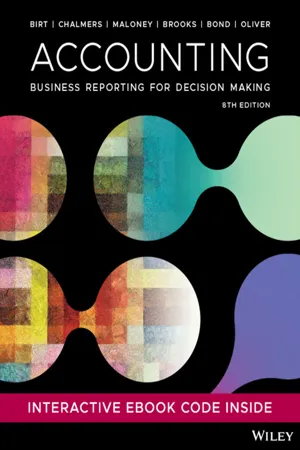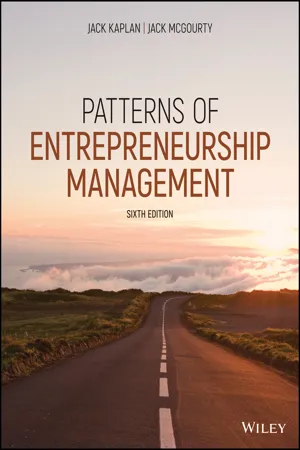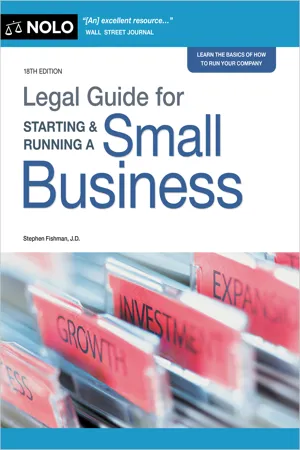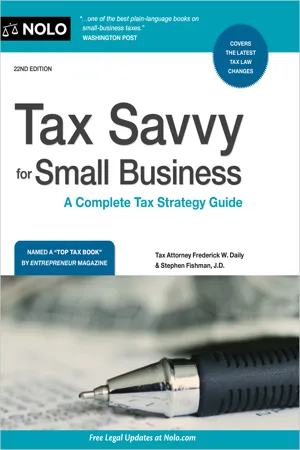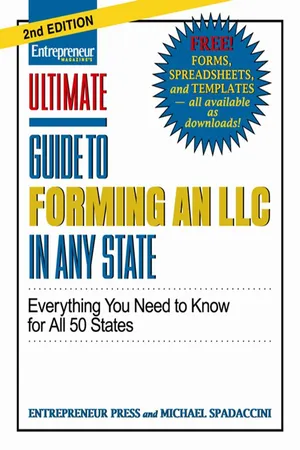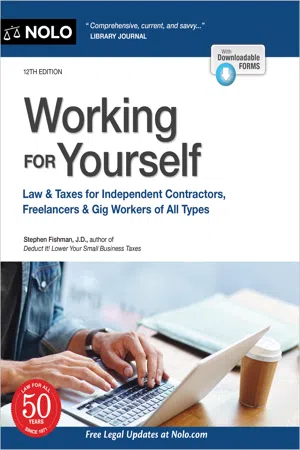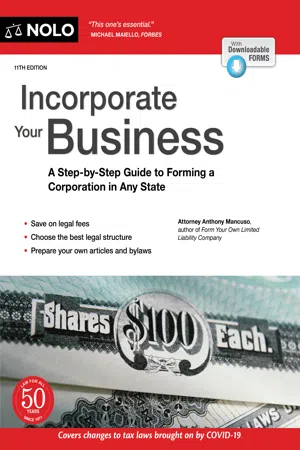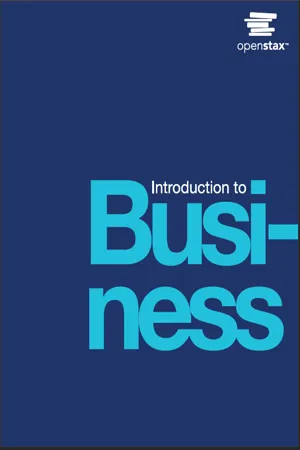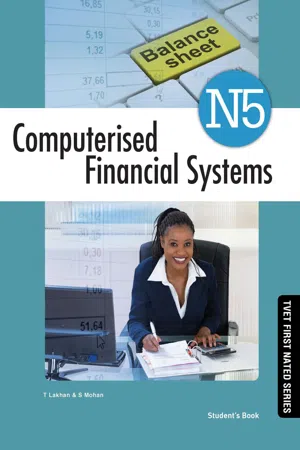Business
Sole Trader
A sole trader is an individual who owns and operates a business on their own. This business structure is the simplest and most common form of business ownership. Sole traders have full control over their business and are personally responsible for its debts and liabilities. They also keep all the profits after tax.
Written by Perlego with AI-assistance
Related key terms
1 of 5
11 Key excerpts on "Sole Trader"
- eBook - PDF
Accounting
Business Reporting for Decision Making
- Jacqueline Birt, Keryn Chalmers, Suzanne Maloney, Albie Brooks, David Bond, Judy Oliver(Authors)
- 2022(Publication Date)
- Wiley(Publisher)
If a Sole Trader business is involved in any form of legal dispute, the individual owner has unlimited liability. Pdf_Folio:83 CHAPTER 3 Business structures 83 For example, the individual could be sued by one of the employees of the business for an act of negligence. If the owner is found guilty of negligence, then they will have to meet all the costs associated with the case and also the amount of damages paid to the employee. Taxation can be a disadvantage — the Sole Trader can pay more tax on business income because individual income tax rates are often higher than the rate applied to companies, which is currently 30 per cent (25 per cent for SMEs). The Sole Trader is also limited by the skill, time and investment of the individual owner. This could be an issue if the Sole Trader wants to take time away from the business or wants to expand the business but is restricted by their own funds. The Sole Trader’s business will cease to exist if the owner decides to leave the business. The Sole Trader business structure can be restrictive for those businesses trying to secure opportunities with the government, as government departments may be reluctant to do business with Sole Traders because of their non-legal status. Further, if the business reports a loss, then the Sole Trader is ultimately responsible for the loss and cannot offset the loss with other business partners. Finally, if something happens to the individual, such as incapacitation or death, then the business will cease to exist. Illustrative example 3.1 demonstrates some of the issues facing Sole Traders. ILLUSTRATIVE EXAMPLE 3.1 The Sole Trader Natasha Bartholomew is the owner of Advantage Tennis Coaching (ATC), a Brisbane tennis-coaching clinic which provides services to customers in the form of tennis coaching. Recall that a service-based entity may provide equipment-based services or largely people-based services. ATC leases a number of courts at the Brisbane Tennis Centre in Tennyson, Queensland. - eBook - PDF
- Jack M. Kaplan, Jack McGourty(Authors)
- 2020(Publication Date)
- Wiley(Publisher)
A brief analysis of each form is presented. Because there are significant tax and nontax differences among the forms, the results and requirements of each form should be carefully considered to ensure that the business form chosen best meets the requirements. 148 SETTING UP THE COMPANY Sole Proprietorship A sole proprietorship is a form of business in which a single owner does business himself or her- self and requires only a business license to open. If the plan is to operate a business under a name other than that of the owner, the business name must be filed as a “doing business as” registration with a state and/or local filing authority (e.g., Jack Smith doing business as Jack’s Smart-Card Con- sulting). The business can be terminated at any time and always ends with the death of the owner. The sole owner has the right to make all the decisions for the business. However, the owner is personally liable for all debts and contracts of the business. Because there is no distinction between personal and business debts, if the business cannot pay its bills, the creditors can sue to collect from the owner’s personal assets. In matters dealing with taxes, profits, and losses, from the business flow directly to the owner and are taxed at individual income tax rates on the owner’s personal tax return. If the owner does not plan to take a salary, income is the profits of the business. There is no carryback or carryforward of losses for tax-reporting purposes. • Simple to Initiate Business. One of the most attractive features of sole proprietorships is how fast and simple it is to begin operations. If a proprietor wishes to operate the business under his or her own name, one simply obtains the necessary license(s), if any, and begins opera- tions. In a sole proprietorship, the proprietor is the business. It is not difficult to start up a proprietorship in a single day if the business is simple. - Available until 31 May |Learn more
- Stephen Fishman(Author)
- 2023(Publication Date)
- NOLO(Publisher)
CHAPTER 1 | WHICH LEGAL FORM IS BEST FOR YOUR BUSINESS? | 7 From an income tax standpoint, a sole proprietor- ship and its owner are treated as a single entity. Business income and business losses are reported on your own federal tax return (Form 1040, Schedule C). If you have a business loss, you might be able to use it to offset income that you receive from other sources. (For more tax basics, see Chapter 8.) Personal Liability A potential disadvantage of doing business as a sole proprietor is that you have unlimited personal liability on all business debts and court judgments related to your business. EXAMPLE 1: Liam is the sole proprietor of a small manufacturing business. Believing that his business’s prospects look good, he orders $50,000 worth of supplies and uses them up. Unfortunately, there’s a sudden drop in demand for his products, and Liam can’t sell the items he’s produced. When the company that sold Liam the supplies demands payment, he can’t pay the bill. As sole proprietor, Liam is personally liable for this business obligation. So the creditor can sue him and go after not only Liam’s business assets, but his other property as well. This can include his house, his car, and his personal bank account. EXAMPLE 2: Sara is the sole proprietor of a flower shop. One day Rex, one of Sara’s employees, is delivering flowers using a truck owned by the business. Rex strikes and seriously injures a pedestrian. The injured pedestrian sues Rex, claiming that he drove carelessly and caused the accident. The lawsuit names Sara as a codefendant. After a trial, the jury returns a large verdict against Rex—and Sara as the owner of the business. Sara is personally liable to the injured pedestrian, which means the pedestrian can go after all of Sara’s assets, business and personal. One of the major reasons to form a corporation or an LLC is that, in theory at least, you’ll avoid most personal liability. - eBook - ePub
- Leonard D. DuBoff, Sarah J. Tugman(Authors)
- 2020(Publication Date)
- Allworth(Publisher)
limited liability company , and a few hybrids. Once the business form has been selected, there are organizational details, such as partnership agreements, operating agreements, or corporate papers to complete. These documents define the day-to-day operations of a business and, therefore, must be tailored to individual situations.An explanation of some of the features of these various business organizations, including their advantages and disadvantages, follows. This book cannot, and does not, include complete coverage of all of the pertinent details about business structures and their pros and cons. Each person’s personal circumstances are different and require consideration of individually relevant factors. As previously suggested, you should consult an attorney and an accountant before deciding to adopt any particular structure. This discussion is meant to facilitate your communication with your lawyer and to enable you to generally understand the choices available.THE AMERICAN DREAM: SOLE PROPRIETORSHIPThe technical name sole proprietorship may be unfamiliar to you, but you may be operating under this business form right now. A sole proprietorship is an unincorporated business owned by one person. Although not peculiar to the United States, it was, and still is, the backbone of the American dream. Legal requirements are few and simple. In many localities, professionals such as photographers are not required to have occupational licenses, while a business license is often required. If you wish to operate the business under a name other than your own, the name must be registered with the state or, in some cases, the county in which you are doing business.There are many financial risks involved in operating your business as a sole proprietor. If you recognize any of these dangers as a real threat, you probably should consider an alternative form of organization. If you are the sole proprietor of a business, the property you personally own is at stake. In other words, if for any reason you owe more than the dollar value of your business, your creditors can force a sale of much of your other personal property to satisfy the debt. Thus, if one of your photographs is defamatory, an invasion of someone’s privacy, or infringes someone else’s copyright, you could find that you are personally responsible for paying any judgment entered against you. - No longer available |Learn more
Tax Savvy for Small Business
A Complete Tax Strategy Guide
- Stephen Fishman(Author)
- 2023(Publication Date)
- NOLO(Publisher)
121 When a Solo Closes Up Shop........................................................................................................................... 122 Death of a Solo ......................................................................................................................................................... 122 Outgrowing the Solo ............................................................................................................................................ 123 108 | TAX SAVVY FOR SMALL BUSINESS “The most enlightened judicial policy is to let people manage their own business in their own way.” —Oliver Wendell Holmes, Jr., U.S. Supreme Court Justice W hat the heck is a sole proprietorship anyway—something from Merry Olde England? Well, if you’re a self- employed small business guy like me, chances are seven in ten that you are one. A sole proprietor, or solo for short, is what the IRS calls any individual who owns and operates a business that isn’t a formal entity like a partnership or corporation. No wonder most folks choose flying solo; it is the easiest, fastest, and cheapest way to go into (and out of) business. Solos are known by more familiar handles like self-employed, freelancer, independent contractor, small-time operator, or one-man band. Solos provide services ranging from teenage babysitting to technology consulting to cosmetic surgery. Or, solos may sell goods on eBay, motorcycles at a shop, or vacuum cleaners door to door. RELATED TOPIC If you’re a microbusiness or home-based business, make sure you read Chapter 14, too. What It Means to Be a Solo— From a Tax Perspective A solo and their business are one and the same in the eyes of the IRS. The profits (or losses) from the operation are reported on the individual’s annual tax return—good old Form 1040—that everyone files April 15. At last count, the IRS reported that 27.82 million folks (not including farmers) reported taxes as solos. - eBook - PDF
Ultimate Guide to Forming an LLC In Any State
Everything You Need to Know
- Michael Spadaccini(Author)
- 2010(Publication Date)
- Entrepreneur Press(Publisher)
THE FOLLOWING ARE EXAMPLES OF SOLE PROPRIETORSHIPS 1. Jake is a plumber who owns his own tools and truck and has no partners. 2. Nancy has a nail salon. She rents the store-front where she operates in her own name and calls the business Nancy’s Nail Salon. 3. Michael Johnson buys and sells sports memorabilia online. ULTIMATE GUIDE TO FORMING AN LLC IN ANY STATE AN OVERVIEW OF BUSINESS ORGANIZATIONS • 3 Taxes for the Sole Proprietor Because a sole proprietorship is indistinguish-able from its owner, sole proprietorship taxa-tion is quite simple. The income earned by a sole proprietorship is income earned by its owner. A sole proprietor reports the sole proprietorship income and/or losses and expenses by filling out and filing a Schedule C along with the standard Form 1040. A sole proprietor need not pay unemployment tax on himself or herself, although he or she must pay unemployment tax on any employees of the business. Of course, the sole proprietor will not enjoy unemployment benefits should the busi-ness suffer. Suing and Being Sued Sole proprietors are personally liable for all of the debts of their businesses. Let’s examine this more closely, because the potential liability can be alarming. Assume that a sole proprietor bor-rows money to operate, but the business loses its major customer, goes out of business, and is un-able to repay the loan. The sole proprietor is liable for the amount of the loan, which can potentially consume all her personal assets. Imagine an even worse scenario: a sole proprietor (or one of his employees) is involved in a business-related ac-cident in which someone is injured or killed. The resulting negligence case can be brought against the sole proprietor owner and against his person-al assets, such as his bank account, his retirement accounts, and even his home. Consider the preceding paragraph carefully before selecting a sole proprietorship as your business form. Accidents happen. Businesses go out of business all the time. - eBook - PDF
The Professional Personal Chef
The Business of Doing Business as a Personal Chef
- Candy Wallace, Greg Forte(Authors)
- 2007(Publication Date)
- Wiley(Publisher)
The business has no existence apart from you, the owner. Its liabilities, or financial obligations; a re- sponsibility or debt, are your personal liabilities. As a result, you undertake the risk of the business for all assets owned, whether or not they are used in the business. Assets are defined as the value of items owned by a business or an individual. You include the income, which is money received during a period in exchange for a prod- uct or service and the expenses or money spent by the business on your own tax return. Most personal chefs choose to operate as sole proprietorships. The major benefits of a sole proprietorship include: · You, the owner, have complete control. When you look in the mirror, you are looking at the person in charge of your company! · A sole proprietorship is the easiest and least expensive business type to start. · You, the owner, receive all the income from your personal chef business. · It is easy to dissolve. The major disadvantages of a sole proprietorship are: · You, the owner, assume total responsibility for all debts. This liability may put your personal assets at risk. · It may be more difficult to raise capital, meaning money or other assets owned by a company or an individual that can be converted to money as a sole pro- prietorship than under the other forms of business. · Benefits such as health and dental insurance may not be fully tax deductible. - No longer available |Learn more
Working for Yourself
Law & Taxes for Independent Contractors, Freelancers & Gig Workers of All Types
- Stephen Fishman(Author)
- 2021(Publication Date)
- NOLO(Publisher)
CHAPTER 2 | CHOOSING THE LEGAL FORM FOR YOUR BUSINESS | 19 Liability Concerns One concern many business owners have is liability: whether and to what extent they are legally responsible for paying their businesses’ debts or judgments entered against their businesses in lawsuits. Business Debts When you’re a sole proprietor, you are personally liable for all the debts of your business. This means that a business creditor—a person or company to whom you owe money for items you use in your business—can go after all your assets, both business and personal (such as your personal bank accounts, your house). Similarly, a personal creditor (to whom you owe money for personal items) can go after your business assets, such as business bank accounts and equipment. EXAMPLE: Arnie, a sole proprietor consultant, fails to pay $5,000 to an office equipment supplier. The supplier sues him in small claims court and wins a $5,000 judgment. As a sole proprietor, Arnie is personally liable for this judgment. This means that the supplier can tap not only Arnie’s business bank account, but his personal savings accounts as well. The supplier can also go after Arnie’s personal assets, such as his car and home. Lawsuits If you’re a sole proprietor, you’ll also be personally liable for business-related lawsuits, which could result in the following kinds of liability: • Premises liability. Responsibility for injuries or damages that occur at your office, workshop, lab, or other place of business. • Infringement liability. When someone claims that you have infringed on a patent, copyright, trademark, or trade secret. • Employer liability. Liability for injuries or damages caused by an employee while he or she was working for you. • Product liability. Responsibility for injuries or damages caused by a product that you manufacture or sell to the public. • Negligence liability. When someone claims that you failed to use “reasonable care” in your actions, resulting in injuries or damages. - No longer available |Learn more
Incorporate Your Business
A Step-by-Step Guide to Forming a Corporation in Any State
- Anthony Mancuso(Author)
- 2021(Publication Date)
- NOLO(Publisher)
Personal liability for business debts, liabilities, and taxes. In this simplest form of small business legal structures, the owner, who usually runs the business, is personally liable for its debts, taxes, and other liabilities. This means that personal assets—for example, cash in a bank account, equity in a home or car, or a personal stock portfolio—can be used to satisfy a court judgment entered against the business. Also, if the owner hires employees, the owner is personally responsible for legal claims—for example, an auto accident—made against these employees acting within the course and scope of their employment. Simple tax treatment. All business profits and losses are reported on the personal income tax return of the owner each year (Schedule C , Profit or Loss From Business , filed with the owner’s 1040 federal income tax return). And this remains true even if a portion of this money is invested back in the business—that is, even if the owner doesn’t pocket business profits for personal use. TIP A corporate comparison. Earnings retained in a corporation are not taxed on the owner’s individual income tax return. Instead, this money is taxed at separate corporate income tax rates. Because corporate tax rates are sometimes lower than individual income tax rates, business owners who leave earnings in their businesses often save tax dollars by incorporating. We discuss this feature of corporations—called income splitting— in “The Corporation,” below. Legal life same as owner’s. On the death of its owner, a sole proprietorship simply ends. The assets of the business normally pass under the terms of the deceased owner’s will or trust, or by intestate succession (under the state’s inheritance statutes) if there is no formal estate plan. ! CAUTION Don’t let business assets get stuck in probate. Probate—the court process necessary to “prove” a will and distribute property—can take up to one year or more. - eBook - PDF
- Lawrence J. Gitman, Carl McDaniel, Amit Shah, Monique Reece, Linda Koffel, Bethann Talsma, James C. Hyatt(Authors)
- 2018(Publication Date)
- Openstax(Publisher)
Disadvantages of Sole Proprietorships Along with the freedom to operate the business as they wish, sole proprietors face several disadvantages: • Unlimited liability. From a legal standpoint, the sole proprietor and the company are one and the same, making the business owner personally responsible for all debts the company incurs, even if they exceed the company’s value. The owner may need to sell other personal property—their car, home, or other investments—to satisfy claims against the business. • Difficulty raising capital. Business assets are unprotected against claims of personal creditors, so business lenders view sole proprietorships as high risk due to the owner’s unlimited liability. Owners must often use personal funds—borrowing on credit cards, second-mortgaging their homes, or selling investments—to finance their business. Expansion plans can also be affected by an inability to raise additional funding. • Limited managerial expertise. The success of a sole proprietorship rests solely with the skills and talents of the owner, who must wear many different hats and make all decisions. Owners are often not equally skilled in all areas of running a business. A graphic designer may be a wonderful artist but not know bookkeeping, how to manage production, or how to market their work. • Trouble finding qualified employees. Sole proprietors often cannot offer the same pay, fringe benefits, and advancement as larger companies, making them less attractive to employees seeking the most favorable employment opportunities. • Personal time commitment. Running a sole proprietorship business requires personal sacrifices and a huge time commitment, often dominating the owner’s life with 12-hour workdays and 7-day workweeks. • Unstable business life. The life span of a sole proprietorship can be uncertain. The owner may lose interest, experience ill health, retire, or die. - eBook - PDF
Computerised Financial Systems N5 SB
TVET FIRST
- T Lakhan S Mohan(Author)
- 2018(Publication Date)
- Macmillan(Publisher)
The information that is necessary to perform this evaluation is contained in the business’s financial statements. For a Sole Trader, a set of financial statements includes the: • Income statement. • Balance sheet. • Cash flow statement. Unit 5.1: Definition A Sole Trader is a form of business ownership. There is only one owner in this type of business. This owner enjoys all the profits of the business and is solely responsible for all the debts of the business. 70 Module 5 The income statement An income statement is a financial statement that measures a business’s financial performance over a specific accounting period. Financial performance is assessed by giving a summary of the business’s income and expenditure over the past financial period. If someone had to ask you, as a student, about your performance in your examinations or assessments, what would you tell them? You would tell them whether you had passed or failed. Similarly, if you want to determine the performance of a business, you would consider whether the business has made a profit (succeeded/passed) or a loss (failed). The income statement indicates this by showing whether the business made a net profit or net loss during a specific period. A net profit is made when the business’s gross income exceeds the operating expenses of the business, where profit is measured or calculated for one financial period. A net loss , in contrast, is made when the business’s expenses exceed the gross income of the business, where loss is also measured or calculated for one financial period.
Index pages curate the most relevant extracts from our library of academic textbooks. They’ve been created using an in-house natural language model (NLM), each adding context and meaning to key research topics.
